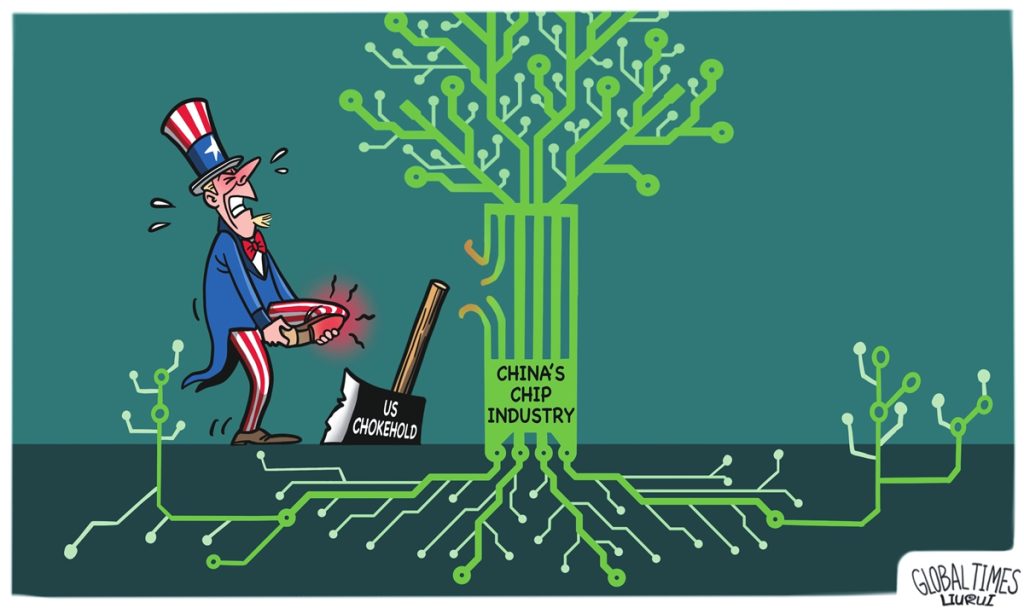Cutting off tech cooperation only makes everyone worse off

Gina Raimondo, Commerce Secretary of the US, has left China "with optimism" after a four-day visit, during which she had high-level talks with Chinese officials. To re-open lines of communication in the economic and business sector after five years of stagnation is, to some extent, "progress." The world has heard clearly that Washington does not "intend to decouple from China or work to 'hold back' the world's second-largest economy."
When she told the media that actions speak louder than words, the Secretary ought to know that this could be the same expectation from the Chinese side. How will the US proceed with its numerous export control measures and carry out its executive order on outbound investment in sensitive technologies of critical sectors? What will be the actions that could turn those much repeated words like "no intention to hold back China" into reality?
In the eyes of ordinary Chinese, what the US has been doing in recent years is exactly holding China back by all means, including cutting off technological exchanges and cooperation. The motive is obvious, because to strangle the runner-up is a time-honored trick written in the playbook of the US. But not only does this mentality and the behavior that follows run counter to the law of technology revolution, it does not seem to work out. What is worse, it is not beneficial to the overall development of human society.
As a coincidence, on the day when Ms. Raimondo was departing from China, Huawei, the Chinese tech giant sanctioned by the US, launched the latest version of its smartphone. The chip in it is wholly Chinese-made. This might frustrate those behind the Huawei-ban. And it should also serve as a reminder that technological progress is governed by its own law. At a time when the world is so closely interrelated and innovative ideas are abundant everywhere, it is almost impossible to stifle anyone. Same as the Wolf Amendment to ban scientific cooperation with China in space didn't stop China from achieving rapid progress in aeronautics back in the day, the export control on high-end chips today will not stop China from acquiring cutting-edge technologies.
Given that China is already a key, indispensable player in global technological exchanges, it is almost impossible to cut off all ties with the country. Any such attempt might spill over to affect the international society. Take 5G in Europe as an example. According to a 5G Observatory Report sponsored by the European Commission, Cyprus now ranks first in the EU with a 100 percent population coverage of 5G, whereas the levels of 5G coverage in Sweden, Estonia, Latvia, Belgium, and Romania are relatively low. The UK is no exception. What is the difference in real-life experience? Well, in Cyprus you could surf at a speed as fast as you could imagine, while in London, you just have to wait on the line.
How come the difference? Cyprus is one of the countries in Europe that made its own choice to install the most suitable communication equipment, provided by Chinese suppliers. It did not follow the Commission's recommendation or the so-called Prague Proposals led by the US warning governments not to rely on 5G technology that may be "influenced by a third country." Some governments may choose to blindly follow the decisions of other countries and forcibly cut off scientific and technological cooperation due to political reasons. But it is their people that will bear the cost of technological regression.
The same mentality of holding China back is coming to the front row again as the Biden administration is considering whether to renew US-China Science and Technology Agreement (STA). This 44-year-old accord has paved the way for sound interactions between the two countries and was meant to promote progress of science and technology for both sides and the world. Ever since 1979 and under the STA framework, China and the US have jointly participated in the world's largest nuclear fusion project, and strengthened cooperation in climate change, environmental protection and public health. Mutual trust and understanding was built up, and solutions to global challenges were explored. This is the kind of arrangement that benefits all and hurts none. The renewal, as what should happen, is the right choice.
However, sticking a shining label of "anti-China" to their forehead, some US politicians blindly put geopolitical competition at the top of their game, ignoring the actual interests of the US government and people. Even though scientists have warned many times that cutting off scientific research links between China and the US due to so-called "security concerns" may slow down the efforts in biotechnology, clean energy, telecommunications and other key areas in the US, the China-hawks are reluctant to truly figure out who is to benefit from cooperation with China.
Any wise head can understand that scientific and technological cooperation will stimulate more inspiration and motivation in various ways. What the US should consider is how it can rely on its own scientific and technological strength and talent advantages to maintain its competitive edge, rather than imposing sanctions and isolating others. It is fine if the US is feeling well in its small yard of national security. But who knows when the fences surrounding that yard will be torn down, by the mighty torrent of time?